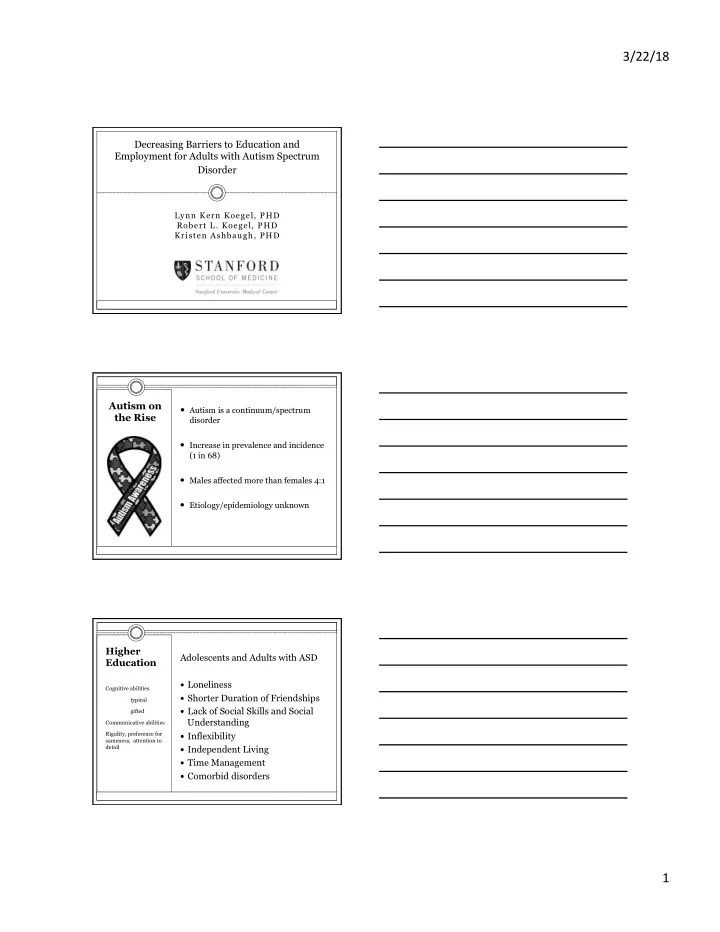

3/22/18 ¡ Decreasing Barriers to Education and Employment for Adults with Autism Spectrum Disorder Lynn Kern Koegel, PHD Robert L. Koegel, PHD Kristen Ashbaugh, PHD Autism on • Autism is a continuum/spectrum the Rise disorder • Increase in prevalence and incidence (1 in 68) • Males affected more than females 4:1 • Etiology/epidemiology unknown Higher Adolescents and Adults with ASD Education Loneliness Cognitive abilities Shorter Duration of Friendships typical Lack of Social Skills and Social gifted Understanding Communicative abilities Rigidity, preference for Inflexibility sameness, attention to detail Independent Living Time Management Comorbid disorders 1 ¡
3/22/18 ¡ Why is support for employment important? l Individuals with autism tend to work fewer hours and earned lower wages per week than nearly all other groups (Cimera & Cowan, 2009) l Currently, few support systems exist to assist individuals with ASD in finding employment l Employment leads to increases in cognition unemployment leads to decreases l Employment leads to improvements in Mental Health and Socialization Pre-Employment Targets and Interventions Communication Skills Conversation Skills ¡ Question-asking ¡ Greetings/Goodbyes ¡ Appropriate detail ¡ Topics of mutual interest ¡ Empathy Nonverbal communication ¡ Eye contact ¡ Posture ¡ Facial expression 2 ¡
3/22/18 ¡ Techniques for improving communication Video based interventions Visual framework Self management Clinician modeling Video Feedback Intervention ¡ Video Feedback: view and evaluate previous performance (Mechling, 2005; Maione & Mirenda, 2006; Rayner, Denholm, & Sigafoos, 2009) ÷ Good Examples ÷ “ Needs Improvement ” Examples ¡ Combination of one or more of these models with other interventions, i.e. self-management Visual framework for appropriate detail Possible strength in visual perception (Grandin, 1995; Boucher & Lewis, 1989; Quill, 1995). ¡ Visual method of thinking Visual components combined with other interventions, i.e. self-management 3 ¡
3/22/18 ¡ Sample visual framework: Appropriate detail Add ¡ ¡ ¡1-‑2 ¡ pieces ¡of ¡ ¡ ¡ ¡ ¡ ¡ ¡ ¡ ¡ Question ¡ Respond ¡ Information Positive Reframing Intervention ¡ Video Feedback ¡ Self-Management Example: “I had a terrible weekend, I didn’t do anything.” Reframed: “I didn’t do much over the weekend, but got to relax.” Example: “I hate it when my brother leaves after the holidays and I can’t see him anymore.” Reframed: “I love seeing my brother and look forward to the holidays when we get to spend time together.” 4 ¡
3/22/18 ¡ Independent Living Skills: Daily Living Checklist Weekly checklist - Self management ¡ Professional Skills ¡ Independent Living Skills ¡ Social Behavior Individualized for each client Flexible and adaptable for ability levels and target behaviors Sample weekly checklist 5 ¡
3/22/18 ¡ Sample weekly checklist Structured Social Planning to Increase Socialization with Peers Social Planning 1. Motivational interests are identified 1. Clinician creates a menu of at least three social activities based 2. on participant ’ s interests Client selects activity 3. Clinician assists in planning of the activity 4. Organizational skills 2. Use of daily planner to document time, place, and activity for the 1. week 3. Social Support Clients given the option to have a similar age peer attend the 1. activity with them for additional support Peer mentor will model and provide feedback on client ’ s 2. socialization during activity jc ballroom dance.mov 6 ¡
3/22/18 ¡ Improved Socialization with Peers Employment Structured Social Improved GPA Activities Dating Reported Confidence Mental Health Decreased Anxiety & Depression 7 ¡
3/22/18 ¡ Collateral benefits of employment Quality of life Contribution to society Independence Co-morbid disorders Long-term cost of services Parental stress 8 ¡
3/22/18 ¡ Summary Multi-Component interventions for improving Socialization and success at work or college Interventions such as Self-Management, Video- Modeling, and Feedback are effective Positive Collateral Gains when targeting social Thank you! Department of Rehabilitation Eli and Edythe L. Broad Foundation Graduate Students Undergraduate Research Assistants Families who participate in our research Lynnk@Stanford.edu 9 ¡
Recommend
More recommend